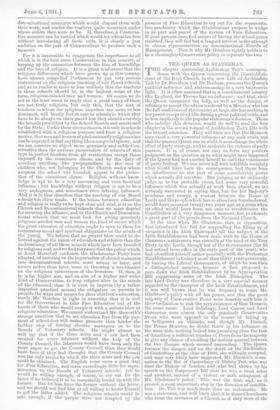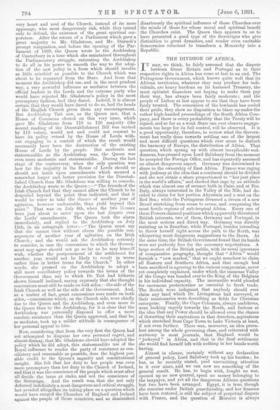THE QUEEN AS STATESMAN. T HE chapter concerning Archbishop Tait's correspon-
dence with the Queen concerning the Disestablish- ment of the Irish Church, in the new Life of Archbishop Tait by Dr. Davidson and Dr. Benham, presents the Queen's political influence and. statesmanship in a very impressive light. It is often assumed that in a constitutional country like England, the Throne has no influence ; and that, since the Queen recognises the folly, as well as the danger, of refusing to accept the advice tendered by a Minister who has the full confidence of the country at large, she has nothing in her power except to sit idle during a great political crisis, and to bow implicitly to the popular statesman's decision. Those who indulge this delusion would do well to read the first chapter in the second volume of Archbishop Tait's Life with the utmost attention. They will then see that the Monarch may exert a very powerful influence at any such crisis, and that the present Queen can so wield it as to change the whole effect of party strategy, and to moderate the violence of party passion. It is, of course, not easy to form any positive judgment on the question as to what might have happened if the Queen had not exerted herself to curb the vehemence of party feeling. We can never tell with infallible certainty what would have been the consequence, had there been no interference on the part of some considerable power which actually did interfere. But judging as we ordinarily judge as to the probable event, had some very powerful influence which was actually at work been absent, we are certainly warranted in saying that, but for her Majesty's prudence and energy, a, contest between the House of Lords and the people which has so often been foreshadowed, would have occurred twenty-two years ago, at a crisis when its effect would have been not only to revolutionise the Constitution at a very dangerous moment, but to alienate a great part of the people from the National Church. At the time when Mr. Gladstone, then in Opposition, first introduced his Bill for suspending the filling up of vacanciea in the Irish Episcopate till the subject of the Irish Establishment had been dealt with by the House of Commons, a statesman was virtually at the bead of the Tory Party in the Lords, though not of the Government (for he had retired from office in the early part of the year), who had identified himself rather pointedly with the Protestant Establishment in Ireland more than thirty years previously, by leaving the Liberal Government, of which he was then a distinguished member, because it Sad proposed to pare down the Irish Establishment by an Appropriation Bill suppressing some of the Irish Bishoprics. The late Lord Derby was therefore in a very especial manner regarded as the champion of the Irish Establishment, and it was well known that he was disposed to resist Mr. Gladstone's policy with all his power, and that the great majority of Conservative Peers were heartily with him in their inclination to risk the very existence of that House in the same cause. Lord Salisbury, Lord Cairns, and Lord Carnarvou were almost the only genuinely Conservative Peers who were opposed to the course of taking up so belligerent an attitude, and though Mr. Disraeli, the Prime Minister, no doubt threw in his influence on the same side, nothing looked less promising than the task of detaching a sufficient number of Peers from the majority to give any chance of avoiding the serious quarrel between the two Houses which seemed impending. The Queen foresaw the danger, and on the death of the Archbishop of Canterbury at the close of 1868, she willingly accepted, and may very likely have suggested, Mr. Disraeli's nomi- nation to the See of Canterbury of Bishop Tait, who was then the Bishop of London, and who had shown by his speech on the Suspensory Bill that he was a most sober and prudent, instead of a violent or rash antagonist of Mr. Gladstone's policy. This was the first, and, as it proved, a most important, step in the direction of concilia- tion. Dr. Tait was much more than an ecclesiastic. He was a statesman, and well knew that it is those Churchmen who treat the revenues of a Church as if they were of the very heart and soul of the Church, instead of its mere appanage, who most dangerously risk, while they intend only to defend, the existence of the great spiritual cor- poration. After the return of a Parliament which gave a great majority to Mr. Gladstone, and Mr. Disraeli's prompt resignation, and before the opening of the Par- liament of 1869, the Queen wrote to the Archbishop of Canterbury in a tone which she maintained throughout the Parliamentary struggle, entreating the Archbishop to do all in his power to smooth the way to the adop- tion of the new policy in a form which should involve as little mischief as possible to the Church which was about to be separated from the State. And from that moment the Archbishop did use, and in the most prudent way, a very powerful influence as mediator between the official leaders in the Lords and the extreme party who would have rejected Mr. Gladstone's policy in the most peremptory fashion, had they dared. Indeed, it is almost certain that they would have dared to do so, had the heads of the English Church given them any encouragement. But Archbishop Tait saw, as the Queen saw, that a House of Commons elected on this very issue, which gave Mr. Gladstone from 110 to 120 majority (the second reading of the Disestablishment Bill was carried by 118 votes), would not and could not consent to have its policy vetoed by the House of Lords with- out engaging in a contest of which the result would necessarily have been the destruction of the existing House of Lords by the people. But moderate and statesmanlike as the Archbishop was, the Queen was even more moderate and statesmanlike. During the last stage of the controversy, when the only question was how far the majority in the House of Lords should or should not insist upon amendments which secured a somewhat larger and better provision for the Disestab- lished Church than Mr. Gladstone was willing to concede, the Archbishop wrote to the Queen :—" The friends of the Irish Church feel that they cannot allow the Church to be despoiled beyond the point thus indicated, and that it would be wiser to take the chance of another year of agitation, however undesirable, than yield beyond this point." That was on July 8th, when the two Houses were just about to enter upon the last dispute over the Lords' amendments. The Queen took the alarm immediately, and replied to the Archbishop on July 11th, in an autograph letter :—" The Queen must say that she cannot view without alarm the possible con- sequences of another year of agitation on the Irish Church ; and she would ask the Archbishop seriously to consider, in case the concessions to which the Govern- ment may agree should not go so far as he may himself wish, whether the postponement of the settlement for another year would not be likely to result in worse rather than in better terms for the Church." In other words, she pressed on the Archbishop to adopt a still more conciliatory policy towards the terms of the Government than any to which Dr. Tait had hitherto shown himself inclined, saying expressly that she thought concessions must still be made on both sides,—the side of the Irish Church as well as the side of the Government. And, as a matter of fact, great concessions were made on both sides,—concessions which, on the Church side, were chiefly due to the Queen and the Archbishop, and even more to the Queen than to the Archbishop, for it is clear that the Archbishop was personally disposed to offer a more resolute resistance than the Queen approved, and that he, as mediator, took up a milder attitude in consequence of her personal appeal to him.
Now, considering that from the very first the Queen had not attempted to disguise her own personal regret, and almost dismay, that Mr. Gladstone should have adopted the policy which he did adopt, this statesmanlike use of the Royal influence to render the party of resistance as con- ciliatory and reasonable as possible, does the highest pos- sible credit to the Queen's sagacity and constitutional insight. She felt that her duty to her people was even more peremptory than her duty to the Church of Ireland, and that it was the conscience of the people which must after all decide the issue at stake, and not the conscience of the Sovereign. And the result was, that she not only deferred indefinitely a most dangerous and critical struggle, but avoided altogether its taking place on a question which would have ranged the Churches of England and Ireland against the people of those countries, and so diminished .disastrously the spiritual influence of those Churches over the minds of those for whose moral and spiritual benefit the Churches exist. The Queen then appears to us to have presented a good type of the Sovereigns who give distinction to great dynasties, and render even excitable democracies reluctant to transform a Monarchy into a Republic.







































 Previous page
Previous page